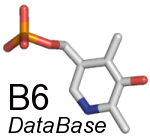|
|
| type |
Journal Article |
| authors |
Miller KA, Phillips RS, Mrázek J, Hoover TR |
| title |
Salmonella utilizes D-glucosaminate via a mannose family phosphotransferase system permease and associated enzymes |
| journal |
J Bacteriol |
| Activity |
4.3.1.29 |
| Family |
4.3.1.29 |
| sel |
selected |
| ui |
23836865 |
| year |
(2013) |
| volume |
195 |
| number |
18 |
| pages |
4057-66 |
| | |
|---|
| keywords |
doi: 10.1128/JB.00290-13 |
| abstract |
Salmonella enterica is a globally significant bacterial food-borne pathogen that utilizes a variety of carbon sources. We report here that Salmonella enterica subsp. enterica serovar Typhimurium (S. Typhimurium) uses d-glucosaminate (2-amino-2-deoxy-d-gluconic acid) as a carbon and nitrogen source via a previously uncharacterized mannose family phosphotransferase system (PTS) permease, and we designate the genes encoding the permease dgaABCD (d-glucosaminate PTS permease components EIIA, EIIB, EIIC, and EIID). Two other genes in the dga operon (dgaE and dgaF) were required for wild-type growth of S. Typhimurium with d-glucosaminate. Transcription of dgaABCDEF was dependent on RpoN (σ(54)) and an RpoN-dependent activator gene we designate dgaR. Introduction of a plasmid bearing dgaABCDEF under the control of the lac promoter into Escherichia coli strains DH5α, BL21, and JM101 allowed these strains to grow on minimal medium containing d-glucosaminate as the sole carbon and nitrogen source. Biochemical and genetic data support a catabolic pathway in which d-glucosaminate, as it is transported across the cell membrane, is phosphorylated at the C-6 position by DgaABCD. DgaE converts the resulting d-glucosaminate-6-phosphate to 2-keto-3-deoxygluconate 6-phosphate (KDGP), which is subsequently cleaved by the aldolase DgaF to form glyceraldehyde-3-phosphate and pyruvate. DgaF catalyzes the same reaction as that catalyzed by Eda, a KDGP aldolase in the Entner-Doudoroff pathway, and the two enzymes can substitute for each other in their respective pathways. Examination of the Integrated Microbial Genomes database revealed that orthologs of the dga genes are largely restricted to certain enteric bacteria and a few species in the phylum Firmicutes. |
| last changed |
2018/02/13 13:28 |
|











